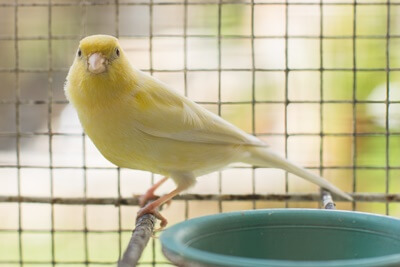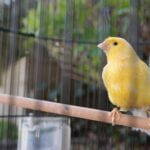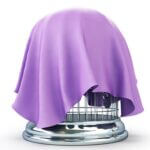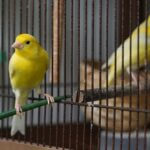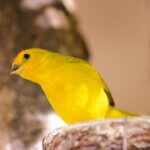Sunlight is an essential source of vitamin D, so inadequate exposure to UV light can make it difficult for the body to function.
Aside from sunlight, your canary can get vitamin D from dietary sources, such as eggs and insects.
The benefits of sunlight in humans and mammals are well documented, but few people realize just how important sunlight is to captive birds.
What Are The Benefits Of Sunlight For Canaries?
Sunlight exposure is crucial to canaries’ physical and mental health for these reasons:
Vitamin D Production
Exposure to sunlight activates vitamin D3 in canaries, which is essential for calcium absorption.
Calcium is perhaps the most important mineral for birds. According to the International Journal of Research in Pharmaceutical and Biomedical Sciences, it’s critical for:
- Maintaining cell turgidity
- Controlling nerve impulses
- Supporting proper heart function
- Aiding in blood clotting
In canaries, calcium promotes healthy bone, feather formation, beak health, and strong and healthy eggs.
Birds deprived of sunlight are likely to suffer from hypocalcemia (calcium deficiency), which can lead to health problems such as weakening bones (osteoporosis) and abnormal feather and beak growth.
Also, female canaries that don’t receive enough sunlight are prone to laying weak eggs and egg-binding (dystocia), which is a life-threatening condition.
Stimulates Hormone Production
According to Animals, sunlight has a crucial role in producing hormones that regulate birds’ physiological and behavioral processes.
Adequate exposure to sunlight stimulates melatonin production in canaries, which helps maintain the sleep-waking cycle (circadian rhythm).
Exposure to sunlight is commonly associated with better moods because sunlight stimulates the production of serotonin in the brain, enhancing the way your canary feels.
Mental Disposition
Canaries exposed to sunlight are more active, playful, and happy. They’ll have a stronger appetite, handle stress more easily, and be more social because their hormones are balanced.
The deprivation of sunlight can lead to a canary becoming stressed and depressed. This can lead to anxiety-based behaviors, such as over-preening, biting, and anti-social behavior.
Furthermore, the mental strain can weaken the canary’s immune system, leading to illness. That creates a vicious cycle, where the canary utilizes more vitamin D to recover.
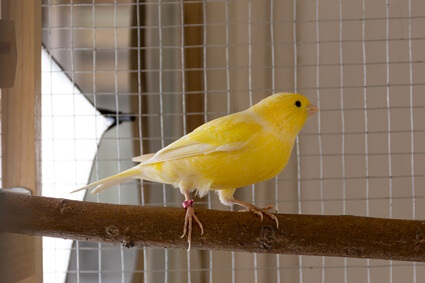
Stimulates Breeding Behavior
Canaries require a minimum of 12-14 hours of daylight to breed because wild canaries live close to the equator.
It’s a natural instinct to breed during the spring and summer when food is most abundant and there’s plenty of vitamin D3. That improves the health of the parents and future chicks.
If your canary’s exposed to less sunlight, it may believe it’s late autumn and winter. It’ll decide that this is a poor time to rear chicks, so any breeding efforts will be stalled.
If you’re preparing your canary for the breeding season, ensure it has the right lighting conditions to get in shape for breeding. That not only concerns its health and mood but hormone activations.
How Many Hours of Sunlight Do Canaries Need?
Wild canaries enjoy 10-12 hours of bright sunlight.
They can also protect themselves from overexposure to harsh sunlight by moving under a canopy of trees. So, you must ensure they receive as much light as they would in their natural habitat.
You can place your canary’s cage outdoors in a location where it’ll receive some direct light for a few hours in the morning. Sunlight is less harsh in the morning than other times of the day.
If you live in a particularly hot area, monitor the outside temperature and ensure it doesn’t exceed 80 degrees Fahrenheit. It’s also wise to provide a shaded area if your canary will be exposed to the light for several hours, which allows it to control exposure and avoid overheating.
If the climate isn’t conducive, use artificial UV lights as a substitute for natural light.
Why Do Canaries Need UV Light?
UV light (UVA and UVB) is essential for the production of vitamin D3 in canaries. Vitamin D3 aids calcium absorption, which is necessary for bone, feather, and beak health.
For this reason, ensuring your canary receives enough UV light will prevent it from developing hypocalcemia and associated health problems.
Also, exposure to UV light promotes mental well-being and stimulates the production of hormones, such as melatonin and serotonin. These regulate physiological and behavioral processes in canaries.
Best UV Light For Canaries
Sunlight is important for canaries, but it’s not always possible to take your bird outside. This may be due to extreme temperatures, lack of space, or predatory animals.
Unfortunately, even if your canary’s cage is in front of a window, it may not receive enough UV light to meet its basic needs because most window glasses filter UV rays.
So, the best alternative is to use full-spectrum lights in your indoor cage.
Fluorescents
Full-spectrum lights have fluorescent tubes that imitate natural sunlight. They do this by producing a wide range of optical radiation, including UVB, which activates Vitamin D3 in canaries.
Color Rendering Index
These lights have a high color rendering index (CRI) greater than 88.
CRI is a lighting metric that describes a light source’s ability to accurately reproduce objects’ colors, especially compared to sunlight.
To provide canaries with the best UV light for optimal health, use full-spectrum bulbs with a minimum color rendering index (CRI) of 91.
Fortunately, most full-spectrum (FS) light bulbs satisfy this minimum requirement.
Distance
Most FS light bulbs don’t project UV lights far from the source.
Typically, they only extend about 18 inches. So, it’s recommended to hang the lighting fixture approximately 18 inches above a canary’s cage.
Installing the fixture further away from a canary’s cage won’t be as effective. Meanwhile, hanging it too close to a canary could lead to corneal scarring.
How Much UVB Full Spectrum Light Should A Canary Have Each Day?
Providing UVB full-spectrum light is an effective way to meet your canary’s need for sunlight. However, be careful not to overexpose it to UVB full-spectrum light.
Ideally, you should program the lighting to be on for 12 hours and then switch it off for 12 hours. Otherwise, prolonged exposure to UVB light can lead to problems, such as:
- Hypercalcemia (too much calcium in the body)
- Abnormal molting
- Disrupted sleeping patterns
Canaries have thinner corneas than humans, which is why they’re more sensitive to UVB light. So, exposing your canary to UVB light for long periods of time can irritate the cornea.

